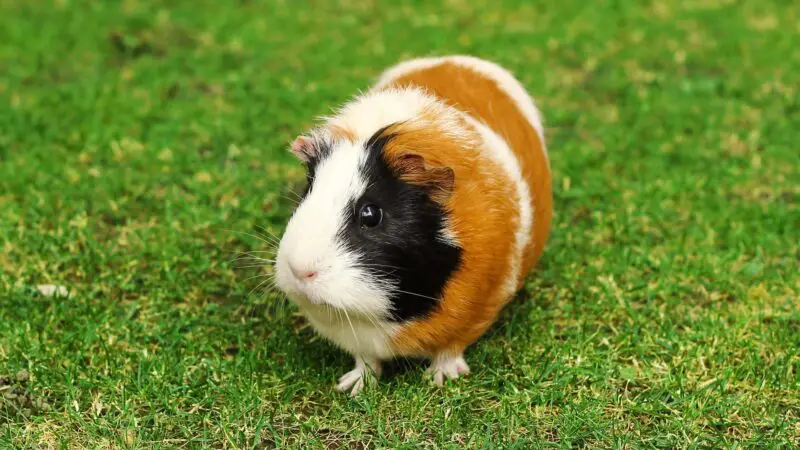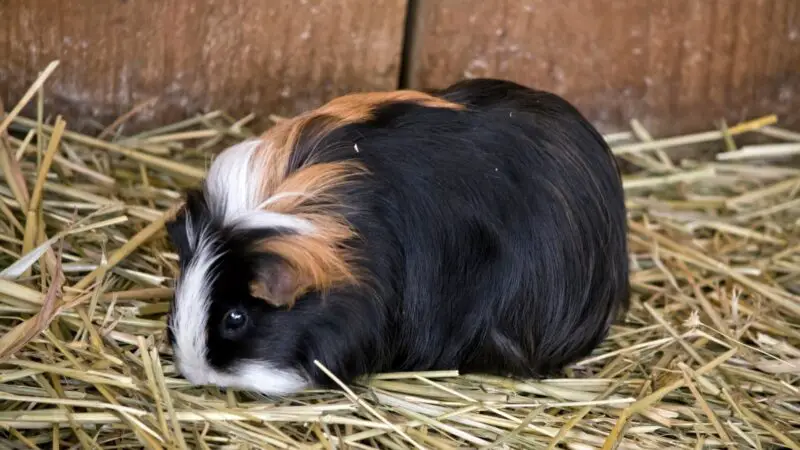Guinea pigs are wonderful pets to have. They love to be handled and cuddled and also they are easy to maintain. However, they also have their problems, especially with nutritional deficiencies that can cause different diseases. It is very important to keep a close eye on your guinea pig and check for any symptoms.
The first thing you should do is to check the overall appearance of your guinea pig. Generally, the coat, ears, weight, eyes and mouth are the areas with the obvious signs that something could be wrong with your guinea pig. If you are unsure about your guinea pig well being, we recommend that you visit your local vet.
Guinea Pig Symptom Checker List
Guinea pigs are very fragile creatures. If you happen to find some of these symptoms on our list, assist them as soon as possible, or contact a local exotic vet.
- Wheezing: Your guinea pig is struggling to breathe, this may indicate either a deficiency or a respiratory infection.
- Refusing to eat or drink: Guinea pigs naturally spend most of their day eating. Therefore, it is a warning sign if your guinea pig suddenly refuses to eat or drink.
- Rough coat: One of the best guinea pig’s health indicators is its coat. Silky and soft coats indicate optimal health and a dull and rough coat are symptoms of an underlying cause.
- Drooling/Bleeding: The mouth area is another strong indicator of your guinea pig’s health. If you notice anything like drooling or bleeding, it may be caused by vitamin C deficiency.
- Diarrhea: An upset stomach is never a good sign in guinea pigs. This could be caused by excessive amounts of fiber.
- Blood in stool and urine: These are the warning signs that your pet may have issues with its urinary tract and stomach. In particular, it could be a sign of either internal bleeding or infection.
- Limping: If you start to notice that your guinea pig is limping or having trouble walking around, this could indicating pain in its joints. This is a complication triggered by the lack of vitamin C.
- Hair loss: This symptom is connected to the roughness and dullness of your pet’s coat. This is primarily caused by a lack of vitamin C or a disease, known as scurvy.
- Weight loss: This is caused by either refusing to eat (one of the reasons could be that you are always giving your pet the same foods and he could be sick of them) or the guinea pig is just suffering from diarrhea.
- Any unusual behavior: Guinea pigs have their own personalities and routines and when they suddenly change moods or routines, something is probably wrong.
Other Tips in Checking Guinea Pigs Symptoms
We recommend that you weigh your guinea pig on a weekly basis. If the pet loses two to three ounces, then there might be an early issue that requires your attention. The situation becomes serious and critical when the cavy has lost 4, or more, ounces. If this scenario happens, please visit a vet immediately.
Be on the lookout for Amoxicillin. Make sure it is not prescribed to your guinea pig. In the event of an antibiotics prescription, ask the vet how fast the antibiotic should take effect. If your guinea pig do poorly on a specific antibiotic and refuses to drink or eat, then call your vet so he can change the medication.
Health Problems in Guinea Pigs

Now that we have listed general common symptoms on possible health threats and risks in guinea pigs, we shall focus on actual health problems that could be the root cause for these guinea pig symptoms.
This list explains the most common health issues in guinea pigs:
Respiratory Infection
One of the most common diseases in guinea pigs is pneumonia. This can be caused by bacteria like the Streptococcus or the Bordetella. Be aware, however, that guinea pigs may naturally harbor bacteria and can be apparently healthy carriers.
Furthermore, the bacteria involved are opportunistic in nature as they infect the animal host, multiply in numbers, and trigger the disease when the opportunity arrives.
Factors like overcrowding, stress, presences of other illnesses can increase the chances of infection. Bacteria is primarily spread via direct contact, airborne particles, and contaminated objects or hands.
Guinea pigs that have been affected will usually have discharge from the nose or its eyes. Also, they can have issues with breathing, abstain from eating and can sneeze frequently. Please watch out for these symptoms, as complications may entail hospitalization for your guinea pig.
Scurvy
Guinea pigs are unable to produce their own source of vitamin C, so they need to include this vitamin in their diet. This is vital for their development and the maintenance of their joints, mucosal surfaces, and skin.
The lack of vitamin C causes skin diseases like scurvy. Look out for symptoms like rough hair, barely moving, not as active as usual, swollen joints or feet, or bleeding from the gums or skin. All of these symptoms are mostly caused by scurvy. Supplements and superfoods are available for this deficiency but also remember that vitamin C oxidizes quickly. Therefore, feed them fresh vitamin C-rich foods.
Approximately 10 to 50 mg of vitamin C is needed daily for guinea pigs, depending also on the health status of the guinea pig (healthy, stressed, young, old, pregnant).
Related: Guinea Pigs Scurvy – Vitamin C Deficiency in Guinea Pig – Guinea Pig Tube
Tumors
Guinea pigs are unfortunately susceptible to breast and skin types of tumors and they will most commonly affect your pet. They are either malignant (causing cancer), or benign in nature. Any unusual mass found on your guinea pig should be a red flag and immediately shown to your vet. The best cure in this scenario is surgical removal.
Abscess
This condition, which is an infected swelling with accumulated bacteria and pus, can seriously affect guinea pig’s skin, bones, lymph nodes, teeth, internal organs, and muscles. Abscess in guinea pigs tends to create thick pus that cannot be reabsorbed or drained with ease.
Therefore, they need to be surgical removed. This is followed with antibiotic treatment, which is chosen based on the bacteria culture that grew in the abscess.
Please note that there are types of abscesses that are harder to treat than others. For example, in some bone and teeth need to be removed together with the infected tissue.
Parasites + Skin Issues
Guinea pigs can also be prone to ringworms. To be clear, this is a fungal infection that involves the skin. No worms are involved. It is worth noting that many species of animal can be ringworm carriers and not show any signs of this illness.
The disease can be spread with ease to other animals. This disease can start showing symptoms if there is insufficient nutrition, if other diseases are present or due to the environmental stress.
Symptoms of ringworm include itching, hair loss and the development of crusty scabs. You can detect lesions most commonly on the face, ears, head, legs, and back. An official diagnosis can be given by the vet, after which the guinea pig will be treated with anti-fungal medication.
Guinea pigs are also susceptible to catching fleas and lice. The fleas are found and diagnosed upon finding feces on the fur. The lice, on the other hand, is diagnosed microscopically when observing a piece of skin and finding eggs. Lice lay their eggs on hair shafts, around the face and ears or on the shoulders.
Mite infestations can not only cause itching but also seizures. If the skin appears crusty and raw, combined with hair loss, there may be a mite infestation issue with your guinea pig. Furthermore, they can cause a secondary bacterial skin infection that will require antibiotic treatments.
Related: 7 Common Skin Problems in Guinea Pigs | Causes and Treatment – Guinea Pig Tube
Barbering
This occurs when the guinea pig chews its own hair or that of its cage-mate. This is mostly caused by boredom or under-stimulation. Therefore, it requires more stimulation and redirected attention to chewing other things such as hay or toys. If two or more guinea pigs are found to be barbering each other, they need to be separated.
Bumblefoot (Pododermatitis)
Bumblefoot is sores that develop at the bottom of the guinea pig’s feet because of pressure are called bumblefoot. The main cause here is the pet being excessively overweight that is kept in wire-bottomed or filthy cages, affecting the skin of the feet. Therefore, there is potential for bacterial growth and infections and can cause pain and less movement. The treatment entails weight loss, surgery and antibiotics.
Urinary Issues
Guinea pigs are highly exposed to urinary stones, which form within the bladder, kidneys or urethra. These stones may get lodged within the urethra and thus cause life-threatening obstructions. It is to be noted that bladder infections are more common in females than male guinea pigs and the stones may develop together with infections.
Typical symptoms of urinary issues in guinea pigs include not eating, straining to urinate, bad posture, blood in urine, frequent urination. An obstruction, however, does not allow the guinea pig to pea at all.
In case of a urinary infection, take your pet immediately to the vet without hesitation. A physical examination will be done, together with blood analysis, urine tests and x-rays. Hospitalization and surgery may be required together with annual check-ups.
Diarrhea
Guinea pigs have sensitive stomachs. Typically, they have the right amount of gastrointestinal flora in order to have proper bowel functions. However, the bacterial flora can become unbalanced or altered and bad gas-producing bacteria can replace the flora, resulting in painful consequences.
Digestion slows down, gas causes pain, intestinal tissues are damaged and toxins are released and in the end, causing severe diarrhea. This must not be overlooked because it can also cause death.
Apart from bacterial infections diarrhea can be caused by parasites such as the coccidia and cryptosporidia. Clinical signs that occur with diarrhea are drastic weight loss, dehydration, low body temperature.
If these symptoms appear, your guinea pig needs immediate attention and care. Be careful with antibiotics, as some of them can contribute to damaging the intestinal flora and also lead to diarrhea. Never give your guinea pig antibiotics bought over-the-counter as they are not meant for them.
Related: Guinea Pig Illnesses A-Z (Full List of Health Problems) – Guinea Pig Tube
Are the Guinea Pig’s Symptoms a Cause of Concern?

Guinea pig’s symptoms are a cause of concern. If you notice anything wrong or unusual about your guinea pig, you should do a check-up yourself first and then if necessary go to the exotic vet. The symptoms may be leading to a much bigger underlining cause and you will subject your pet to pain and suffering. Ultimately, it may lead to death if nothing is done.
After How Long Do the Symptoms or Complication Go Away?
This depends on the issue. A slight vitamin C deficiency can be cured immediately with foods rich in vitamin C. Infections and stones, however, take a little longer to cure.
Can Homeopathy Help With Infections and Other Complications?
Homeopathy cannot help infections and other complications that may guinea pigs experience. With bacterial infections or complications, such as scurvy or urinary stones, antibiotics are needed. Otherwise, symptoms will get worse and seriously compromise your guinea pig’s life. Think wisely and twice before adopting alternative cures.
List of Sources
How to Care for Your Guinea Pig
